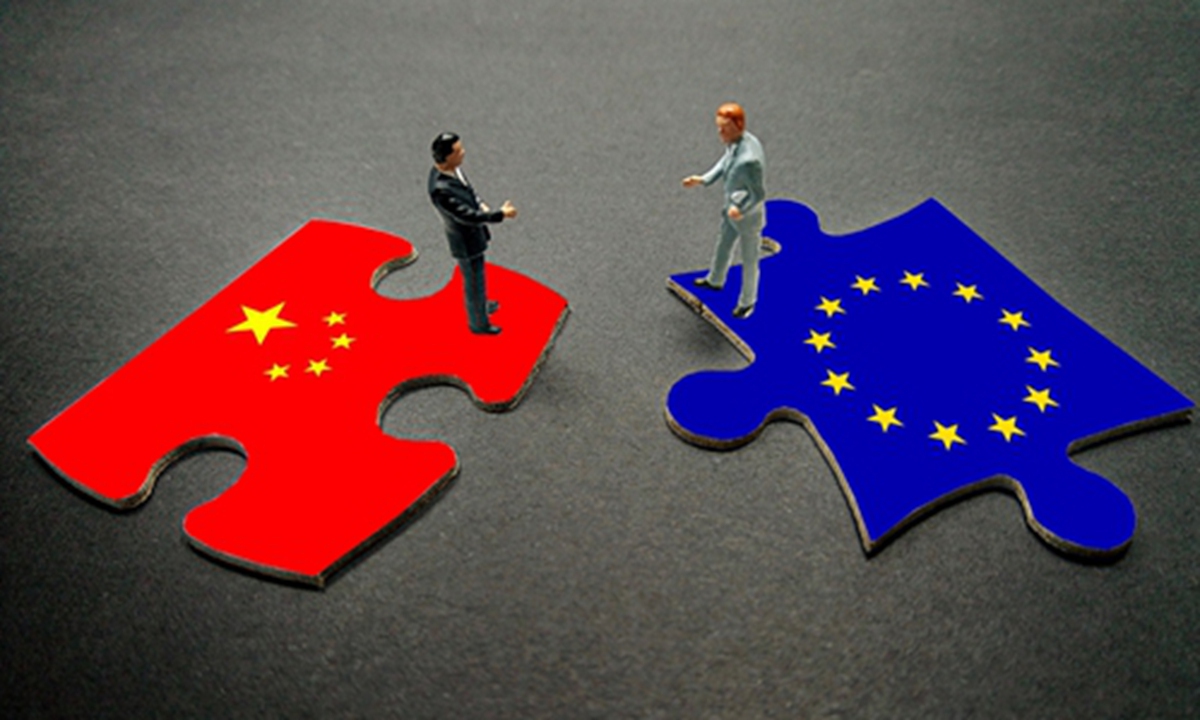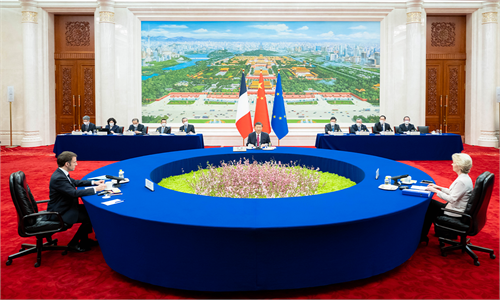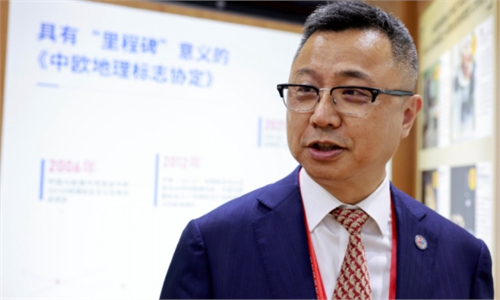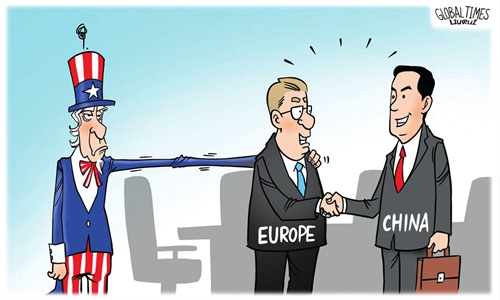More European senior officials to visit China when Macron’s call for ‘strategic autonomy’ wins more support

China-EU relationship Photo: VCG
On the heels of French President Emmanuel Macron and European Commission president Ursula von der Leyen, EU top diplomat Josep Borrell and German Foreign Minister Annalena Baerbock will visit China, Chinese Foreign Ministry announced on Wednesday.
Experts believe more European officials will continue to visit China, elevating Beijing's relationship with Europe via dialogue, especially when others have echoed Macron's latest call for European "strategic autonomy," which can facilitate Europe to form an objective view of China.
Macron's remarks have caused continued negativity from some US politicians, who worry such voices will wake up more European countries and exert a heavy blow to the Biden administration's hegemony-centered foreign policy, said experts, while holding the belief that the US' "coercive act" to pressure Europe to act as its vassal in a geopolitical game will only double down on Europe's determination to pursue independence from Washington.
Intensive visits
At the invitation of China's State Councilor and Foreign Minister Qin Gang, Josep Borrell, High Representative of the European Union for Foreign Affairs and Security Policy and Vice-President of the European Commission, will pay a visit to China and hold the 12th round of China-EU High-level Strategic Dialogue from April 13 to 15, the Chinese Ministry of Foreign Affairs announced on Wednesday.
However, later on Wednesday, Borrell said on Twitter that he has postponed the planned trip to China, after testing positive for COVID-19.
German Foreign Minister Annalena Baerbock will pay an official visit to China from April 13 to 15. During the visit, Qin and Baerbock will co-chair the sixth round of the China-Germany Strategic Dialogue on Diplomacy and Security, Chinese Foreign Ministry said on Wednesday.
The visits of Borrell and Baerbock came after Macron and von der Leyen concluded their trips last week.
Wang Wenbin, spokesperson of the Chinese Foreign Ministry, said at Wednesday's routine press briefing that Qin and Baerbock will hold a comprehensive, deep conversation on China-Germany and China-Europe relations, as well as regional and international hot issues.
On Borrell's visit, Wang noted that China and Europe should enhance strategic communication and coordination, boost mutual trust, focus on cooperation and overcome disruptions, and join hands to cope with global challenges.
One important agenda of Borrell and Baerbock's visits is to further stabilize China-Europe relations, Cui Hongjian, director of the Department of European Studies at the China Institute of International Studies, told the Global Times on Wednesday.
Cui said the real importance of successive visits by European officials to China is that the two sides can maintain communications and dialogue despite of all the differences. "As long as we are heading toward the same direction, the problems we have will be resolved sooner or later."
Europe is now engaged in a heated debate over "strategic autonomy," spurred by Macron's previous remarks urging Europe to reduce its reliance on the US and to be cautious of being dragged into a conflict between Beijing and Washington over the Taiwan question.
Defying some criticism on his remarks, Macron again emphasized the concept of "strategic autonomy" for Europe in a speech at the Nexus Institute in The Hague, Netherlands on Tuesday.
Reiterating "strategic autonomy" amid swelling controversy in Europe demonstrates Macron's clear vision for the future of Europe and for a multipolar world, and his resolve to push forward such an objective, Cui said.
There is strong support for Macron's plea inside Europe. President of the European Council Charles Michel told media on Wednesday that European leaders are becoming increasingly favorable toward Macron's push for "strategic autonomy" away from the US.
Macron's voice has jammed the brake when Europe, hijacked by the US on the latter's chariot, is gradually descending to become one of Washington's followers, Sun Keqin, a research fellow at the China Institutes of Contemporary International Relations, told the Global Times on Wednesday.
The debate about "strategic autonomy" in Europe is fierce, and Sun said such a debate will eventually help European countries to form a more objective and comprehensive view of China and the international order.
A coercive US
Although the debate is about Europe's future, one of the most vocal critics is the US. Several American politicians fired condemnations at Macron's remarks or resorted to threats.
Mike Gallagher, chair of the House Select Committee on China, told Fox News on Monday that Macron's statements "were embarrassing, they were disgraceful… and very geopolitically naive."
US senator Marco Rubio said in a tweet on Sunday that "If Macron speaks for all of Europe, and their position now is they're not going to pick sides between the US and China over Taiwan… maybe we should basically say we're going to focus on Taiwan and the threats that China poses, and you guys handle Ukraine and Europe."
In response to the denouncement from Washington, Wang Wenbin said on Wednesday that a certain country does not want others to be independent and always bends others' will to obey its orders. Insisting on strategic autonomy will win more respect and friends while suppressing others' will only meet with more resistance and opposition, Wang said.
Macron's loud plea will wake up more and more European countries to publicly distance themselves from the US - Europe's own voice calling for independence has long been suppressed, and now its patience is wearing thin, Lü Xiang, research fellow at the Chinese Academy of Social Sciences, told the Global Times. Europe's collective call will deal a heavy blow to the Biden administration's diplomatic policies, Lü said.
The US' coercive policies and unequal and unfair treatment of Europe have been laid bare by Washington's uneasiness at seeing Europe's pursuit of autonomy, Cui said.
The US reaction should open Europe's eyes wide to see what transatlantic allies really mean to the US, and encourage the continent's determination to further reduce its reliance on Washington, Cui said.




